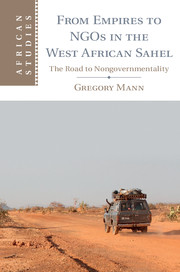Book contents
- Frontmatter
- Contents
- List of Maps and Figures
- Acknowledgments
- Maps
- Note on Terminology
- Introduction
- Part I
- Part II
- Introduction to Part II: Sahelian Migrations and State Thought
- 3 “French” Muslims in Sudan
- 4 Well-Known Strangers: How West Africans Became Foreigners in Postimperial France
- Part III
- Works Cited
- Index
- References
4 - Well-Known Strangers: How West Africans Became Foreigners in Postimperial France
Published online by Cambridge University Press: 05 January 2015
- Frontmatter
- Contents
- List of Maps and Figures
- Acknowledgments
- Maps
- Note on Terminology
- Introduction
- Part I
- Part II
- Introduction to Part II: Sahelian Migrations and State Thought
- 3 “French” Muslims in Sudan
- 4 Well-Known Strangers: How West Africans Became Foreigners in Postimperial France
- Part III
- Works Cited
- Index
- References
Summary
In Paris, in March 1965, Robert Delavignette took a bus. A Black woman collected his ticket. When he got off the bus, he found three men, Black men, emptying trashcans. All this provoked, in the mind of this retired colonial administrator, a reflection on the place of Blacks in France. The three men were there as workers, and they came from the independent states south of the Sahara. Like the ticket collector and Delavignette’s fellow passengers, they had become “part of Paris.” No one was interested in their presence. Passersby did not find it remarkable, but Delavignette did. The ticket collector, he wrote, was from the Antilles or Réunion. She was therefore a French citizen (and she did not have much in common with the trash collectors, other than the color of their skin and the fact that they lived and worked in Paris). As for the trash collectors, they were all citizens of new states that were formerly French colonies. They were thus “foreign nationals” (ressortissants étrangers), a phrase with which Delavignette slipped reflexively into administrative language. Were they also foreigners?
During the First World War, Delavignette recalled, Lucie Cousturier, a French painter who welcomed West African soldiers in her home outside Fréjus, considered them (or their grandfathers) “unknowns” (inconnus), and she made an enormous effort to get to know them. His bus trip inspired a question for Delavignette: Were the Blacks he had run into just as unknown (for “us”) fifty years later? “They do not give [that] impression,” he wrote. In any case, the ticket collector could not in any way be considered a foreigner, but the men could. That quality of the well-known stranger represents a point of departure, for the quality of “foreigner” was not natural. It was with decolonization, wrote the French historian Pap Ndiaye, “that French identity reoriented itself around a continent and a [skin] color. Put differently, subjects became strangers (étrangers). Colonial visibility [that is, in public life, in the legislature, and so on] gave way to postcolonial invisibility.” After 1960, “the Black population … grew progressively even as it disappeared as a political issue.” Ndiaye is not wrong, but his account short-circuits a moment I take to be important: the creation of African citizenship.
- Type
- Chapter
- Information
- From Empires to NGOs in the West African SahelThe Road to Nongovernmentality, pp. 120 - 162Publisher: Cambridge University PressPrint publication year: 2014

